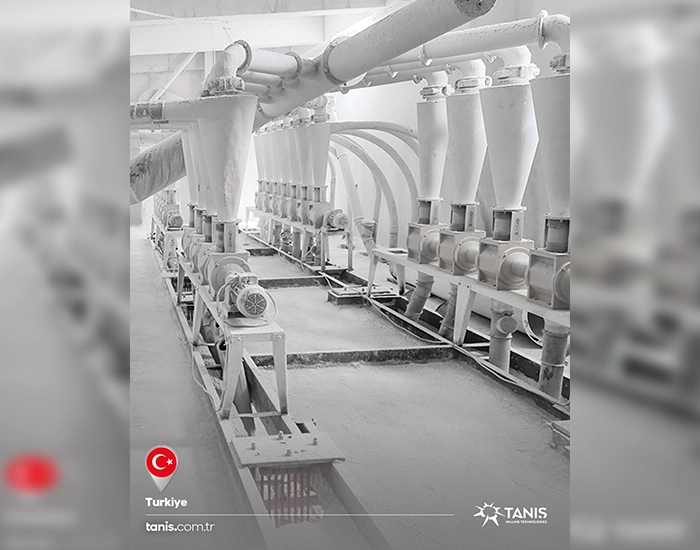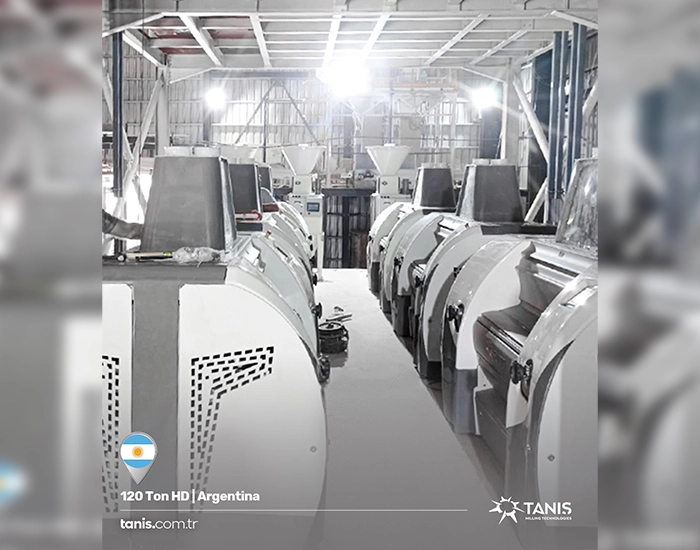Turkey’s mill sector is one of the fundamental pillars of food security, holding strategic importance in the country’s economy. Turkey’s deep-rooted agricultural tradition and leading position in world flour exports make this sector significant on both local and global scales. Factors such as changing consumer preferences, technological developments, and cost fluctuations continuously shape local market dynamics. In this content, we will comprehensively analyze the current state of Turkey’s mill sector, competitive conditions, challenges, and opportunities.
Sector Size and Importance in the Economy
Turkey’s mill sector has significant economic size and contributes to the country’s gross domestic product. The sector contains numerous active mill facilities and provides direct and indirect employment opportunities to many people.
The mill sector, which holds an important share within the food industry, has strategic importance as it provides the main raw material for bread, which is a basic food item. The sector also creates a foreign exchange source with its significant annual flour exports.
Turkey’s Grain Production and Flour Consumption
Turkey ranks among the world’s leading wheat producers with significant wheat production. Production is concentrated in Central Anatolia, Southeastern Anatolia, and Marmara regions. However, wheat imports are also made due to high domestic consumption and export demand.
Per capita annual flour consumption in Turkey is above the world average. Bread holds a central position in Turkish culinary culture, with daily per capita bread consumption at a significant level. Additionally, widespread consumption of flour products such as pasta, biscuits, and cakes also increases flour demand.
Mill facilities in Turkey are positioned considering wheat production regions and consumption centers. Some facilities are located in Central Anatolia, some in Marmara, some in Southeastern Anatolia, some in Aegean, and the remainder in other regions.
A significant portion of businesses in the sector consists of small and medium-scale enterprises (below a certain daily capacity), while some are medium-large and some are large-scale facilities. Capacity utilization rate remains at a certain level. This situation indicates there is some idle capacity in the sector.
Turkey’s Global Position in Flour Exports
Turkey has been the leader in world flour exports by quantity in recent years. With significant flour exports, it meets an important portion of the global market.
The main markets for exports are Middle East and African countries. Iraq, Syria, Angola, Yemen, Sudan, and Somalia are among the largest export markets. Turkey’s geographical location, logistical advantages, production quality, and competitive prices are the main factors behind export success. However, political instabilities, payment risks, and increasing global competition stand out as challenging factors for exports.
Market Segmentation and Product Diversity
Turkey’s flour market is divided into different segments according to usage areas:
Bakery Flour: This segment, which constitutes a large portion of the market, is aimed at bread and other bakery product production.
Industrial Flour: Special quality flours used in industrial production such as pasta, biscuits, and cakes constitute a portion of the market.
Home Consumption: Packaged flours reaching consumers directly through retail channels cover a portion of the market.
In recent years, demand for special products such as whole wheat flour, gluten-free flour, and protein-enriched flours is increasing. While growth is observed in the premium segment, the economic segment follows a more stable course.
Competition Intensity and Market Structure
Competition in the mill sector is quite intense. While there are numerous active mills in Turkey, large players control a significant portion of the market. This situation shows that the market has a fragmented structure.
Large-scale enterprises stand out with integrated production systems, technological investments, and export-oriented strategies, while small and medium-scale enterprises mainly serve regional markets. Istanbul, Konya, Gaziantep, Çorum, and Trabzon are important centers where strong mill enterprises are located.
Main factors providing competitive advantage include cost efficiency, product quality, technology level, supply chain management, and customer relations. In recent years, quality and service-oriented differentiation strategies rather than price competition are gaining importance.
The most determining factor in flour pricing is wheat cost. Wheat has the largest share in total cost, followed by energy costs, labor, packaging, and other expenses.
Fluctuations in wheat prices are affected by global commodity prices, exchange rates, climate conditions, and government policies. Due to the direct impact of flour prices on basic food products like bread, there may occasionally be interventions in price increases.
Profit margins in the sector generally remain low. Large and integrated facilities have a more advantageous cost structure by benefiting from economies of scale.
Flour and Flour Product Consumption Habits
In Turkey, bread is an indispensable part of tables and forms the basis of daily nutrition. While traditional white bread is the most widely consumed product, interest in alternative products such as whole wheat bread, rye bread, and bran bread is also increasing.
Regional consumption habits show differences. While consumption is higher in Eastern and Southeastern regions, consumption amounts are relatively lower in large cities and western regions. However, product diversity demand is higher in large cities.
Impact of Health and Nutrition Awareness
The increase in health and nutrition awareness in recent years affects consumer preferences. Demand is increasing for whole grain flours, low glycemic index products, and gluten-free alternatives. This trend directs mills to expand their product portfolios and develop special flour formulations.
While the gluten-free products market in Turkey is still in the development stage, it is showing growth. Functional flours and vitamin-mineral fortified products also attract interest especially among upper income groups.
Raw Material Supply and Farmer Relations
Raw material supply for mill enterprises occurs from three main sources: direct purchase from local farmers, purchase through TMO (Turkish Grain Board) channels, and imports. Large-scale mills generally develop contracted production models with farmers for stable quality and quantity.
Wheat quality and variety are critically important in flour production. Proper blending of different types such as durum wheat for pasta, bread wheat, and soft wheat ensures obtaining desired product characteristics.
TMO’s Role and Market Regulations
The Turkish Grain Board (TMO) plays a regulatory role in the wheat market. The purchase prices it announces during harvest period serve as a reference for market price formation. TMO also tries to balance price fluctuations through stock management and market intervention when necessary.
Since flour and bread prices directly affect consumers, there may occasionally be policy interventions regarding price increases. In this case, TMO’s provision of wheat supply to the market at appropriate prices is an important balancing factor for the sector.
Technological Innovation and Modernization Level
The technological adaptation level in Turkey’s mill sector varies according to mill scale. Large and medium-large scale facilities are generally equipped with the latest technology equipment, while modernization needs are more pronounced in small and medium-scale facilities.
Some facilities in the sector have been established or completely modernized in recent years. Some have undergone partial modernization, while the remainder need technological renewal. New investments and modernization projects are carried out focusing on efficiency improvement, quality enhancement, and energy savings.
Automation and Digitalization Trends
In large-scale facilities, process automation and digital control systems are widely used. Advanced SCADA systems enable monitoring and management of the entire production process from a single center. However, Industry 4.0 and full digitalization across the sector are still in the initial stage.
The rate of businesses using data analytics and decision support systems is still limited. These systems provide advantages especially in raw material quality assessment, process optimization, and energy efficiency areas.
Tanış A.Ş.’s Local Market Approach
Our Expertise and Experience in the Local Market
As Tanış A.Ş., we lead the development of Turkey’s mill sector with our sector experience spanning many years. Our expert team, which deeply understands local market dynamics, develops solutions suitable for the specific needs of mill enterprises.
Our numerous reference projects and installation services throughout Turkey are indicators of our reliability and expertise in the sector. Our collaborations with local universities, sector associations, and research institutions ensure that we keep our knowledge base continuously updated.

Challenges and Opportunities in the Local Market
Main Challenges Facing the Sector
The main challenges facing Turkey’s mill sector are:
Excess Capacity: Some of the installed capacity in the sector is idle, which intensifies price competition and suppresses profitability.
Raw Material Price Fluctuations: Volatility in wheat prices makes cost and price management difficult.
Energy Costs: Increasing energy prices raise operational costs.
Financing Difficulties: High interest rates and exchange rate fluctuations create financial difficulties especially for small and medium-scale enterprises.
Informal Production: Businesses that do not comply with standards and engage in informal production create unfair competition.
Growth and Development Opportunities
The main opportunities in the sector can be listed as follows:
Value-Added Products: Special-purpose flours, functional flours, and premium products offer higher profit margin potential.
Export Markets: There is potential to expand existing export markets and enter new markets.
Technological Investments: Technological investments that provide efficiency and quality improvements create competitive advantage.
Vertical Integration: Integrated value chain models extending from flour production to flour products offer margin improvement opportunities.
Sustainability: Energy efficiency, water conservation, and waste management solutions create both cost advantages and brand value.

Frequently Asked Questions
Turkey’s mill sector presents a stable outlook with its leading position in world flour exports and strong domestic demand, despite excess installed capacity and intense competitive conditions. In the future, consolidation, technological modernization, and increased orientation toward value-added product segments are expected. Diversification of export markets and vertical integration strategies offer growth potential.
In mill investment, proximity to raw material supply sources, logistical advantages, energy costs, availability of qualified workforce, regional incentives, and competition intensity should be considered. Capacity planning should be done considering existing market saturation, and value-added product segments and export potential should be evaluated. In technology selection, energy efficiency and automation level are critically important for long-term competitive advantage.
Conclusion and Call to Action
Turkey’s mill sector, with its deep-rooted history, strong export performance, and strategic importance, is a dynamic industry open to development. Changing market conditions and consumer expectations direct businesses toward technological innovations and innovative solutions. As Tanış A.Ş., we are proud to be your reliable solution partner in this transformation journey of the sector.
